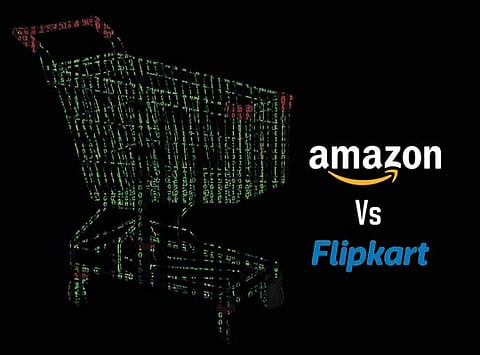Who will win the Indian e-commerce battle: Flipkart or Amazon?
Both sides will sink in big bucks despite losses to grab a larger share of the market.

When the world’s largest retailer, Walmart Inc, acquired a majority stake in Indian e-commerce firm Flipkart for an eye-popping $16 billion, the question on everybody’s lips was: Who’s going to win the fierce online retail battle in India, Flipkart or its rival Amazon?
The deal certainly dealt a blow to Amazon, but both sides have mountains of cash that they will likely sink in despite massive losses in their bid for scale and market share. With the Walmart deal, Bengaluru-based Flipkart has got $2 billion of new equity funding to step on the gas in India. Amazon has also infused Rs 2,600 crore into its India unit and Amazon India’s authorised capital has nearly doubled to $4.74 billion.
“As the industry is still in a nascent stage both Amazon and Walmart will incur cost in developing it further. Hence it will translate into loss for some time but with their sourcing capabilities, cost optimisation, efficiency in system they will be in a position to break even soon,” says Anil Joshi, founder and managing partner at investment firm Unicorn India Ventures. “Money will not be a problem for them as both are deep-pocketed entities and have the potential to raise money themselves.”
Both Amazon and Flipkart have already been struggling with massive losses in an effort to grab a share of the online retail market, which is estimated to grow to $200 billion in the next 10 years from around $30 billion today. Flipkart, for instance, saw a 68% increase in losses in 2016-17. International e-commerce giant Amazon ended 2017 with losses of $3 billion, mostly attributed to its spending in India. Amazon did not give separate financials for its India business.
With both sides pouring in mega bucks, one thing is for sure: Competition is going to hot. “Both have their own sizeable cash reserves, and the outcome in India will determine the access to its growing middle class consumers for dominance, outside of the U.S,” said Adrian Lee, research director, Gartner.
The losses and cash burn are not lost to Walmart. In a call with analysts on Wednesday, Walmart officials said that in the “mid- to long-term, as the business scales and efficiencies are realised, we expect losses to decline and returns to improve”.
“Walmart does not like cash burn, so the corpus will last longer than otherwise,” says Harminder Sahni, founder and managing director, retail consultant Wazir Advisors.
Recommended Stories
While Flipkart and Amazon slug it out for the Indian market, the Indian customer will be a winner all the way.
Twist in the Tale
Meanwhile, an Economic Times report on Friday said SoftBank, the largest investor in Flipkart, was yet to make up its mind to sell its 21% stake in the Indian e-tailer. The report said SoftBank was still figuring out the tax liabilities if it sold its stake in Flipkart in less than a one year of investment.
SoftBank officials refused to comment, but a person close to the development said “a person can change their mind”, when asked about the status of the stake sale. He was referring to SoftBank founder and CEO Masayoshi Son.
(INR CR)
During an earnings presentation on Wednesday, Son inadvertently mentioned that the transaction with Walmart valued SoftBank's stake at $4 billion. It remains to be seen what really is happening to SoftBank’s stake.
Read more